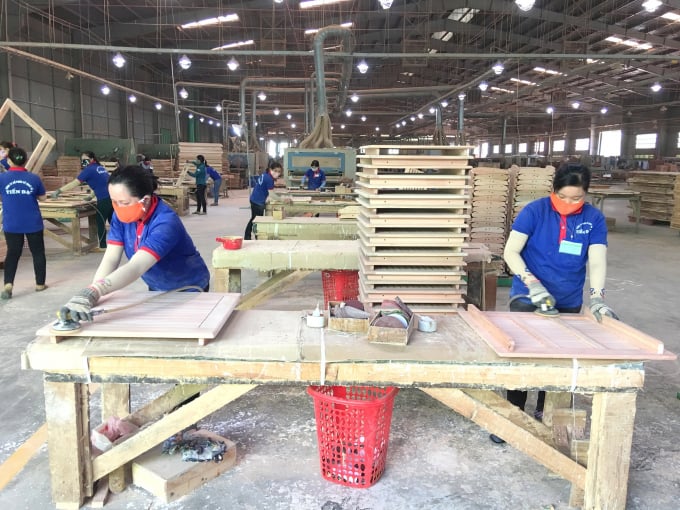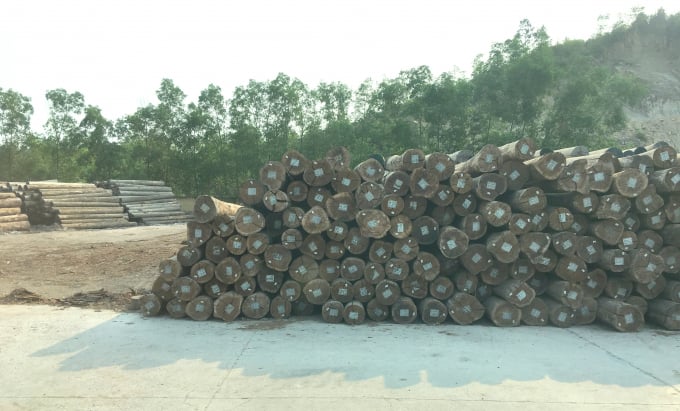November 25, 2025 | 08:53 GMT +7
November 25, 2025 | 08:53 GMT +7
Hotline: 0913.378.918
November 25, 2025 | 08:53 GMT +7
Hotline: 0913.378.918
Ministry of Agriculture and Rural Development (MARD) and the Vietnam Timber and Forest Product Association (VIFOREST) in coordination with the People's Committee of Binh Dinh province organized a conference on April 22 to develop the material area for the wood export processing industry, MARD Deputy Minister Le Quoc Doanh chaired the conference.
According to VIFOREST Chairman Mr. Do Xuan Lap, raw materials play a decisive role in the production growth of the wood processing industry for export, accounting for 40-60% of the products' price structure. Every year, Vietnam's export wood processing industry has to import 5-6 million m3 of round timber for production.
However, in recent years, the world supply of wood materials has fluctuated due to the impacts of the Covid-19 pandemic and now the Russia-Ukraine conflict. Thus, developing planted wood material areas is a strategy to stabilize production for wood processing enterprises. It is an extremely urgent task that should be done immediately.

MARD Deputy Minister Le Quoc Doanh speaks at the conference. Photo: V.D.T.
“The world's wood material supply and demand have faced big changes in recent years, especially since the Russia-Ukraine conflict. Meanwhile, Vietnam's wood processing industry relies heavily on imported materials so it is directly affected by the above situation.
In addition, the Covid-19 pandemic has also negatively affected the imported wood materials supply sources. A shortage of containers has caused increases in transportation costs and a shortage of labor. Delivery time is not guaranteed, causing instability for production and reducing the competitiveness of wooden furniture in the world market," Lap said.
According to Mr. Lap, after the Covid-19 pandemic, the Russia-Ukraine conflict along with sanctions by Western countries against Russia has prompted the country to issue a ban on round timber exports and some other products. The supply of wood materials from Russia which used to be 30 million m3 per year now has sharply decreased and will continue in the near future.

Vietnam's wood processing industry for export relies heavily on imported raw materials. Photo: L.K.
“To stabilize raw material sources for the domestic processing industry, nothing is more necessary than the promotion of large timber forests, especially improving the quality of planted forests and developing the large timber forests areas with sustainable forest certification to meet the needs of the market in the future," Lap affirmed.
According to the VIFOREST, the forestry industry development strategy for the period 2021-2030, a vision for 2050, and a project on developing the wood processing industry in the period 2021-2030, along with the adjustment and supplement of Decree 102 has shown the Government's determination in implementing the commitments to the legal use of timber following the Voluntary Partnership Agreement (VPA) that was signed with the EU in 2018; an agreement on illegal logging and trade that it signed with the US Government in October 2021 and many other bilateral and multilateral trade agreements.
Currently, wood imported from "clean" sources accounts for the majority and is continuing to grow, while those from risky sources tend to decrease. However, in 2021, nearly 1.8 million m3 of round timber from risky sources were still imported into Vietnam and in the first 3 months of 2022, another 0.5 million m3 will be imported. To cope with the situation, it is urgent to promote the development of large-scale afforestation areas to reduce the shortage of raw materials in the wood processing industry.
Mr. Lap also said to ensure production for the wood industry, it is necessary to guarantee the material sources, especially in the context that import is in a deadlock situation. Planted forest timber is a decisive factor in the sustainable development of Vietnam's export wood processing industry. According to Lap, currently, newly planted timber can only meet 60-65% of domestic use and export demand. In the coming time, Vietnam needs to find solutions and promulgate policies to boost developing planted forests.

The imported wood material prices currently stand at a very high level, causing difficulties for processing enterprises. Photo: V.D.T.
“For that, we have to consider large-scale afforestation in the context of an increasingly narrow land area. We must make full use of existing afforestation land funds as well as the poor land and inefficient forest areas. Simultaneously, we should apply science and technology, and put into use new quality varieties to increase the yield from the current 80-90 m3/ha to 150-200 m3/ha like other countries in the world. To do that, Vietnam must first build a market for transferring forest land and equitizing forestry enterprises, to attract investment from domestic and foreign companies in afforestation," said Lap.
“It must be affirmed that our country's wood processing industry for exports has favorable market conditions, but it is still depending much on imported materials. Localities must set plans for material areas, focusing on large planted timber forests and forests with certificates of sustainable management in order to improve productivity and quality.
In particular, localities need to focus on managing forest varieties, controlling the quality of seeds, ing technical investment in planting, selecting and researching suitable large timber varieties, promoting forest environmental services, supporting people and forest owners to take better care of forests, enhance the granting of certificates for sustainable forest development", emphasized MARD Deputy Minister Doanh.
Translated by Linh Nguyen

(VAN) Viet Nam is entering the pivotal period of 2025-2030, moving toward the formulation of the Remote Sensing Law, which will establish a legal foundation for the development of national digital data.

(VAN) The agricultural sector is finalizing the strategic framework for emission reduction, setting the goal of sharply cutting methane and 403.7 million tons of CO2 equivalent and moving toward Net Zero by 2050.
/2025/11/22/2236-1-153832_483.jpg)
(VAN) The National Marine Spatial Planning is opening up opportunities for sustainable blue sea development across 21 coastal localities.

(VAN) Viet Nam’s forestry sector is undergoing a comprehensive transformation, strengthening management, protection, and development efforts to maintain ecological security and drive green, sustainable growth.

(VAN) Viet Nam is accelerating efforts to digitize reservoir operations, from real-time data to hydraulic modelling.
/2025/11/21/3348-2-102623_454.jpg)
(VAN) National Assembly delegate Nguyen Thi Lan has proposed adding special mechanisms to attract human resources to the agricultural, forestry, and fishery sectors, addressing the shortage of high-quality personnel.

(VAN) Over the past two decades, the unified legal framework for water resource management has been perfected, becoming a crucial foundation for ensuring national water security.